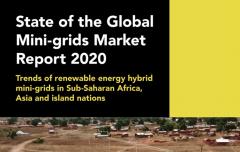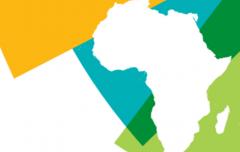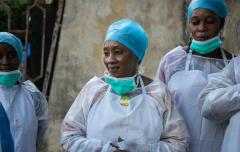Damilola Ogunbiyi: A global energy transition must be a just energy transition
This article was first published in The Global Energy Agenda, Atlantic Council
2015 was a monumental year for energy. Not only did the world secure a historic agreement on climate change through the Paris Agreement, global governments also agreed on a new blueprint to achieve a more sustainable, fair future through the adoption of the Sustainable Development Goals (SDGs).
A clean and inclusive energy transition is at the heart of both these agreements. Yet far too often, when we talk about the energy transition, we talk about megawatts, storage, and fuels only through a climate lens. While all critical elements, we often forget that this energy transition for billions of people and communities around the world is much simpler: being able to access energy at all.
That is why Sustainable Development Goal 7—access to affordable, reliable, sustainable, and modern energy for all by 2030—is so important to ensure that, not only do we achieve an energy transition that supports climate action, but we deliver a just and equitable energy transition that leaves no one behind and provides access to a basic right that many of us take for granted.
In today’s world, everyone has the right to a dignified life where they can achieve their full potential. We must seize this moment to deliver sustainable energy for all and change this injustice faced by so many.
This is an urgent challenge. Since 2015, energy access progress has been painfully slow. The latest data shows that not only are we off track to meet universal energy access by 2030, we risk missing it by decades. 789 million people globally are living without electricity, and 2.8 billion—over a third of the world’s population—are living without access to clean cooking solutions and fuels. Thanks to the unprecedented challenges of the COVID-19 pandemic, we’ve had a painful reminder that energy access saves lives.
Sadly, these figures do not fully reflect the reality on the ground for many vulnerable populations. Research shows that millions more do not have reliable—or anything beyond very basic—electricity access. For too long, simply owning a solar lamp has been deemed as energy access. Yet true access allows people to be productive, providing them with economic opportunity.
For clean cooking—the often-overlooked element of energy access—the picture is even more worrying. New data from the World Bank and partners shows that four billion people around the world still lack access to clean, efficient, convenient, safe, reliable, and affordable cooking energy, a challenge that is now a public health crisis in its own right. While around 1.25 billion are considered in transition with access to improved cooking services, 2.75 billion face significantly higher access barriers.
The reality is that we cannot reduce these access gaps without taking an environmental justice approach. This means we must genuinely and repeatedly engage all people—across race, gender, geography, and income—to develop equitable solutions that will truly meet everyone’s needs.
Equity is key. Today, inequalities in energy have never been starker, disproportionately impacting African countries, where over 70 percent of the population without access lives. For example, entire nations—including Nigeria, Myanmar, and Ethiopia— use less electricity than Americans use just playing video games in one year. People in Senegal, Ethiopia, Tanzania, and other African countries also use less annual electricity than the average fridge in America does.
As the world continues to deal with the pandemic, growing climate change impacts, and societal injustices, it is critical we accelerate a just energy transition that can address these inequalities.
'Recover Better' from the pandemic
Even before the pandemic hit, progress to meet universal energy access was too slow. Now COVID-19 risks derailing progress further. The good news is that we can still meet SDG7 by 2030, but this window of opportunity is closing. COVID-19 has presented us with a unique opportunity to accelerate action and allow countries to 'Recover Better' from the pandemic to change the SDG7 trajectory and enable allow countries to reap the rewards of sustainable energy for all.
These rewards come in the form of resilient economic growth, new jobs, and a cleaner environment. For example, investments in clean energy produce three times the number of jobs as the same size investment in fossil fuels, and for every US dollar invested in the transition towards renewable energy, an additional 93 US cents of additional GDP growth is expected to occur.
'Decade of Action' on SDG7
As we begin this ‘Decade of Action’ on SDG7, as called for by the United Nations, we have the data, knowledge, and technology we need to deliver this targeted progress. Political commitment, greater finance, and policy must catch up.
Finance, like in many areas of development, remains a challenge. Recent SEforALL data has highlighted a chronic underinvestment in electricity and clean cooking finance for African and Asian countries that need it the most. The little finance that is committed is not being disbursed quickly enough—stalling energy access projects that will improve people’s lives and grow economies—a challenge the development finance sector and partners must quickly overcome.
Technology also has an important role to play in the transition. Our research shows that 111 million households could be served by mini-grids in Sub-Saharan Africa, Asia, and small island nations by 2030. Despite this opportunity and it being the least-cost option for electricity access in many areas, the mini-grid market remains nascent. Now, more than ever, we need a thriving off-grid sector that can power life-saving infrastructure and provide electricity to the more remote populations that the traditional grid will not reach. These efforts must ensure diversity and engage indigenous companies to truly deliver energy solutions that meet the needs of people on the ground and drive localized economic growth.
Solutions must also be gender inclusive. Far too often, women and girls are disproportionately impacted by a lack of energy access. Women bear the brunt of cooking with dirty fuels—putting themselves at risk of indoor air pollution which kills an estimated four million each year—and miss out on economic opportunity, with wages for women with access to energy 59 percent higher than the wages of those without.
It is clear the challenges ahead of us can only be achieved if we work together. Energy is the golden thread to economic development, and we cannot achieve the vision of the SDGs or Paris Agreement without an inclusive energy transition.
High-level Dialogue on Energy
The next few years are key. To support these efforts, the UN General Assembly will host its first High-level Dialogue on Energy in over forty years in September. The Dialogue—co-led by SEforAL—will increase SDG7 action and ambition just ahead of a pivotal COP26 later this year. As High-Level Champion for the Dialogue, I am committed to ensuring that diverse leaders are heard and shape a just and equitable energy transition for all.
We need countries to arrive at the Dialogue with the same ambition they did in 2015, and ready to recommit to a global energy compact that puts the focus on an integrated, resilient energy transition that rapidly accelerates the pace of progress on access, prioritizes energy efficiency, and supports faster growth of renewables to leave no one behind.
In today’s world, everyone has the right to a dignified life where they can achieve their full potential. We must seize this moment to deliver sustainable energy for all and change this injustice faced by so many.





